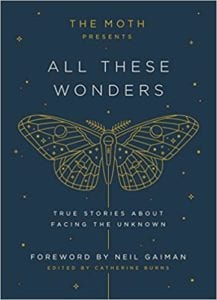
You’ve probably heard memorable stories told live by Tig Notaro, Louis C.K., and new voices on the top-of-the-charts radio show and podcast the Moth. Now, in celebration of the 20th anniversary of the Moth, the show’s artistic director Catherine Burns has assembled a superb collection of these stories in a new book. All These Wonders is, indeed, a wonder. Here, Catherine introduces the collection.
Crown Archetypecrownpublishing.com
Shelf Unbound/Podster: You’ve been with the Moth for decades—how did you select which stories to include in this anthology?
Catherine Burns: We transcribed and read most of the stories that have been told since we put our last collection together back in 2012. So our editor at Crown, Matt Inman, and I read about 300 stories. We were primarily looking for stories that worked as well on the page as they did live. Sometimes a story can be amazing in the room or on the radio, but not quite land on the page. We were also looking for a wide range of voices coming from people with diverse backgrounds and life experiences. We wanted grandmothers and teenagers. Famous voices like John Turturro, Tig Notaro and Louis C.K., but also less familiar names who have extraordinary stories to tell like a young woman who fled Afghanistan with her family.
Shelf Unbound/Podster: The Moth began in the 1990s as a series of live events with people telling stories from their lives and then the Moth Radio Hour debuted in 2007 and now we have the popular the Moth Podcast. What do you think are the common denominators of these stories that make them so arresting in all these formats, even in the
print book?
Catherine: The number one quality all great Moth storytellers share is their willingness to be vulnerable—to dare to be their most authentic selves, whether we are hearing them live or reading the story in a book after the fact. Most of the best stories are told by people who are willing to tell on themselves, because doing so makes you relatable. What most connects us to each other are our foibles, or mistakes. Our missteps make us interesting.
Shelf Unbound/Podster: In your introduction to the anthology, you close with: “And when we dare to listen, we remember that there is no ‘other,’ there is only us, and what we have in common will always be greater than what separates us.” Is there a particular story in the anthology that changed or enlightened your perspective on a person or topic?
Catherine: One story that stays with me is Hasan Minaj’s Prom. The story is about his prom date—a girl named Bethany—ditching him at the last minute because her parents don’t approve of her going to the dance with Hasan, whose parents immigrated from India. On the surface, the story is about a young man trying to fit in, and being excluded because of the color of his skin. But at the end of the story, he tells his father what happened, and his father chastises him for being angry with Bethany and her family. His father says, “When I first emigrated from Aligarh, I was scared. I was scared of everything that America had to offer. I was afraid that you were gonna get caught up in the wrong crowds. I was afraid that you were gonna get into drugs, which is why I tried to protect you from everything. And see, Bethany’s family, they were scared, too. They were scared of people that looked like us for whatever reason. And you were scared of me, and Bethany was scared of her parents. Everybody was scared of everybody. But, Hasan, you have to be brave, and the courage to do what’s right has to be greater than your fear of getting hurt.” I love the idea that we can only combat racism and ugliness in our own communities by being fearless ourselves—that we can’t let other people’s fear of what we are stop us from doing what’s right.
Shelf Unbound/Podster: I was particularly moved by the story from the man who had been a 9-year-old boy at the Bergen Belsen concentration camp in Nazi Germany. How did you find this man and his story and encourage him to share it?
Catherine: That’s the amazing Tomi Reichental. We had a Mainstage in Dublin, and Meg Bowles, who is one of our lead Mainstage directors, was reading in a local newspaper about a community award Tomi was given—so she googled him to find out more about him and learned he had been in Bergen Belsen. She dug further and found his book and then the story. One of the things that’s so special about the story is how, until we get to the end, we really experience the story with him at age nine—it’s a child’s view of Bergen Belsen. Chilling.
Shelf Unbound/Podster: Do you have a favorite story in the anthology?
Catherine: Well that’s kind of like asking me to choose among children! On the fun end, Jessi Klein’s “Tired From New York,” about getting her dream job at SNL but then discovering that the day-to-day reality of it is a nightmare. On the more serious side is the story told by Hector Black. Hector is a Quaker whose daughter was murdered by a man who broke into her house one night. Hector’s hatred of her murderer was eating him up, and so he decided to try to learn more about the man who had taken the life of his child. In discovering what had brought the man to this place, Hector was able to find compassion for him and, ultimately, forgive him. The last line of the story is, “I think forgiveness is possible, even for the worst among us. And I do believe we all need forgiveness, God knows.” Amen to that.
